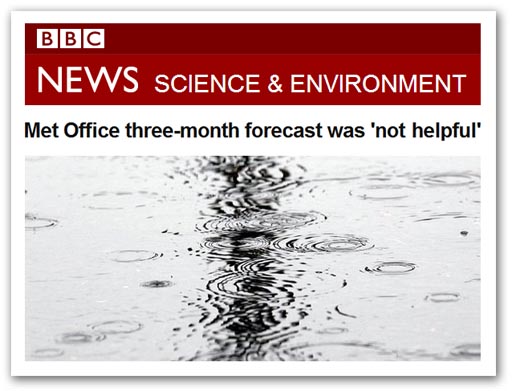Then, the Met Office predicted average rainfall and "slightly" favoured drier than average conditions. Yet, between March and April 2012, the UK experienced an extraordinary shift from high pressure and drought to low pressure and downpours.
After the embarrassment experienced by the Met Office following its infamous "barbecue summer" forecast of 2009, the state meteorology service had ceased publishing its seasonal forecasts. But it still made them available to contingency planners and government bodies, such as the Environment Agency.
However, it has admitted that the advice it issued was "not helpful". The words of its analysis later confessed: "Given that April was the wettest since detailed records began in 1910 and the April-May-June quarter was also the wettest, this advice was not helpful".
In a note to the government chief scientist, the Met Office chief scientist Julia Slingo sought to explain the difficulty of constructing long-distance forecasts, given the UK's position at the far edge of dominant world weather systems. She said last year's calculations were not actually wrong because they were "probabilistic".
This is a wonderful intellectual sleight of hand, allowing the Met Office, like so many bureaucracies, to deny that it ever gets anything wrong. And this is perhaps more necessary than most people think.
As Booker points out in his 3 October 2009 column, one reason why their short-term forecasts are often so comically wrong is that, as the Met Office likes to boast, they are produced with the aid of the same super-computer used to provide the IPCC with its predictions of what the world's climate will be like in 100 years' time.
According to the Slingo doctrine, these forecasts are not actually wrong, because they too are "probabilistic". Most, likely, though, they are just about as helpful as the quarterly analyses, which by the Met Office's own admission, means not helpful at all.
Nevertheless, in the way of things modern - as Autonomous Mind so often points out, this does not stop it awarding its staff handsome performance bonuses. For her forecasting performance in 2011/12, Slingo was awarded a bonus of £25-30,000 on top of her £135,000 annual salary.
The nature of the beast, however, can be deduced from her responses on the BBC Radio 4's Today programme, this morning, when she admitted that a serious pressure on water resources in March last year did mean a "slightly enhanced risk" of the drought continuing into April.
"I felt it was right to emphasise the risk of dry conditions continuing as a precautionary principle", she added, justifying this by saying that: "We have to look over a large number of events and I think on about 65 percent of occasions we do give indeed very helpful advice".
Basically, flipping a coin gives a fifty percent probability of giving "helpful advice", which means that Slingo gets her bonus for the extra fifteen percent, over and above random. Nice work if you can get it.
COMMENT THREAD
